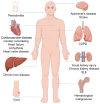Implications of Clonal Hematopoiesis in Hematological and Non-Hematological Disorders
- PMID: 39682303
- PMCID: PMC11640442
- DOI: 10.3390/cancers16234118
Implications of Clonal Hematopoiesis in Hematological and Non-Hematological Disorders
Abstract
Clonal hematopoiesis (CH) is associated with an increased risk of developing myeloid neoplasms (MNs) such as myelodysplastic neoplasm (MDS) and acute myeloid leukemia (AML). In general, CH comprises clonal hematopoiesis of indeterminate potential (CHIP) and clonal cytopenia of undetermined significance (CCUS). It is an age-related phenomenon characterized by the presence of somatic mutations in hematopoietic stem cells (HSCs) and hematopoietic stem and progenitor cells (HSPCs) that acquire a fitness advantage under selection pressure. Individuals with CHIP have an absolute risk of 0.5-1.0% per year for progressing to MDS or AML. Inflammation, smoking, cytotoxic therapy, and radiation can promote the process of clonal expansion and leukemic transformation. Of note, exposure to chemotherapy or radiation for patients with solid tumors or lymphomas can increase the risk of therapy-related MN. Beyond hematological malignancies, CH also serves as an independent risk factor for heart disease, stroke, chronic obstructive pulmonary disease, and chronic kidney disease. Prognostic models such as the CH risk score and MN-prediction models can provide a framework for risk stratification and clinical management of CHIP/CCUS and identify high-risk individuals who may benefit from close surveillance. For CH or related disorders, therapeutic strategies targeting specific CH-associated mutations and specific selection pressure may have a potential role in the future.
Keywords: acute myeloid leukemia; clonal cytopenia of undetermined significance; clonal hematopoiesis; clonal hematopoiesis of indeterminate potential; myelodysplastic neoplasm.
Conflict of interest statement
The authors declare no relevant conflicts of interest.
Figures


References
-
- Arber D.A., Orazi A., Hasserjian R.P., Borowitz M.J., Calvo K.R., Kvasnicka H.M., Wang S.A., Bagg A., Barbui T., Branford S., et al. International Consensus Classification of Myeloid Neoplasms and Acute Leukemias: Integrating morphologic, clinical, and genomic data. Blood. 2022;140:1200–1228. doi: 10.1182/blood.2022015850. - DOI - PMC - PubMed
Publication types
LinkOut - more resources
Full Text Sources
Research Materials
Miscellaneous

